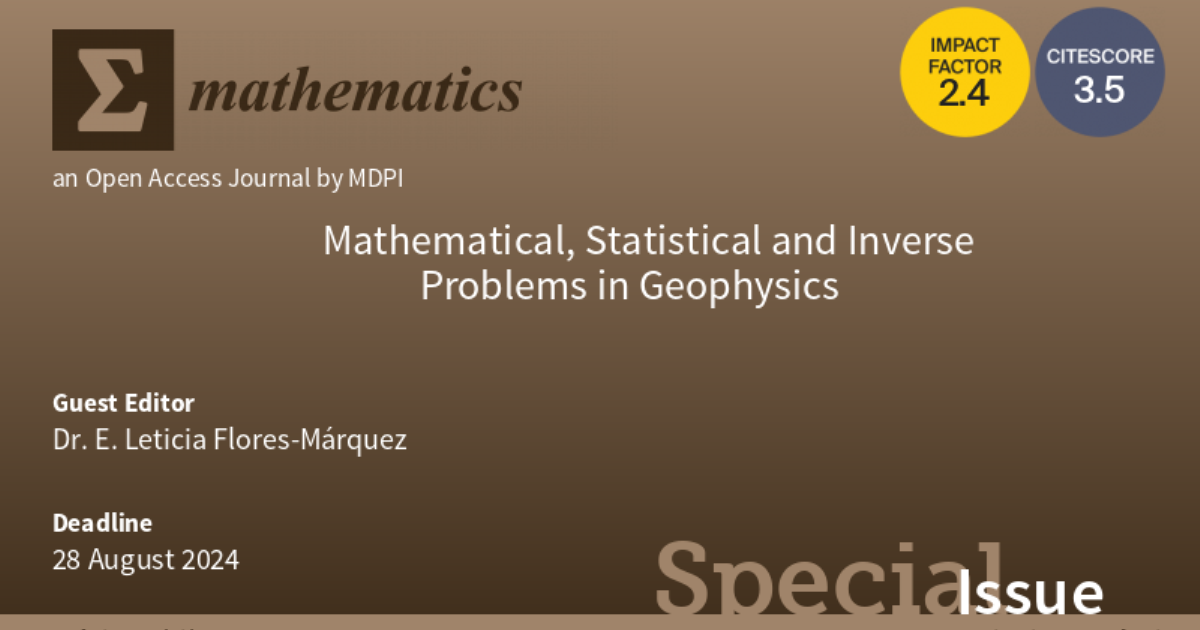Mathematical, Statistical and Inverse Problems in Geophysics
A special issue of Mathematics (ISSN 2227-7390). This special issue belongs to the section "Engineering Mathematics".
Deadline for manuscript submissions: 28 August 2024 | Viewed by 144

Special Issue Editor
Interests: analysis, modeling, inversion and interpretation of geophysical data; integration and numerical modeling of geophysical data in porous media (hydrogeological, geothermal, oil models); nonlinear statistical analysis of geophysical data (in terms of entropy, fractals, multifractals, power laws, Brownian motion)
Special Issue Information
Dear Colleagues,
As computational power continues to grow, mathematics will play a central tool in advancing our understanding of the Earth and its processes, because it allows us to develop models that describe the Earth's behavior and helps to adequately interpret and analyze observational data. In geophysics, inversion problems refer to the process of estimating the subsurface properties of the Earth based on measurements carried out at or near the Earth's surface, as well as satellite measurements. These problems are essential for understanding the Earth's internal structure and properties such as density, conductivity, seismic velocity, and more. Inversion techniques are widely used in various branches of geophysics, including seismology, electromagnetics, and gravity and magnetic exploration.
This Special Issue, “Mathematical, Statistical and Inverse Problems in Geophysics“ aims to explore the theoretical and practical applications of mathematical and statistical tools to overcome the challenges of data uncertainty, complex geological structures, unpredictable natural events, and inverse problems in the field of geophysics. It also seeks to encompass papers that address how inversion techniques can be used to analyze and interpret geophysical data, predict natural phenomena, and improve the understanding of the Earth's physical properties and processes. We welcome submissions of manuscripts addressing either the current or future development trends in this field.
The topics of interest for this Special Issue include, but are not limited to, the following:
- Differential equation for modeling geophysical data;
- Computer modeling in geophysical research;
- Nonlinear statistical process in geophysics;
- Inverse problems in geophysics.
Dr. E. Leticia Flores-Márquez
Guest Editor
Manuscript Submission Information
Manuscripts should be submitted online at www.mdpi.com by registering and logging in to this website. Once you are registered, click here to go to the submission form. Manuscripts can be submitted until the deadline. All submissions that pass pre-check are peer-reviewed. Accepted papers will be published continuously in the journal (as soon as accepted) and will be listed together on the special issue website. Research articles, review articles as well as short communications are invited. For planned papers, a title and short abstract (about 100 words) can be sent to the Editorial Office for announcement on this website.
Submitted manuscripts should not have been published previously, nor be under consideration for publication elsewhere (except conference proceedings papers). All manuscripts are thoroughly refereed through a single-blind peer-review process. A guide for authors and other relevant information for submission of manuscripts is available on the Instructions for Authors page. Mathematics is an international peer-reviewed open access semimonthly journal published by MDPI.
Please visit the Instructions for Authors page before submitting a manuscript. The Article Processing Charge (APC) for publication in this open access journal is 2600 CHF (Swiss Francs). Submitted papers should be well formatted and use good English. Authors may use MDPI's English editing service prior to publication or during author revisions.
Keywords
- geophysics
- uncertainty
- complex geological structures
- unpredictable natural events
- inverse problems
- statistics and inverse tools





